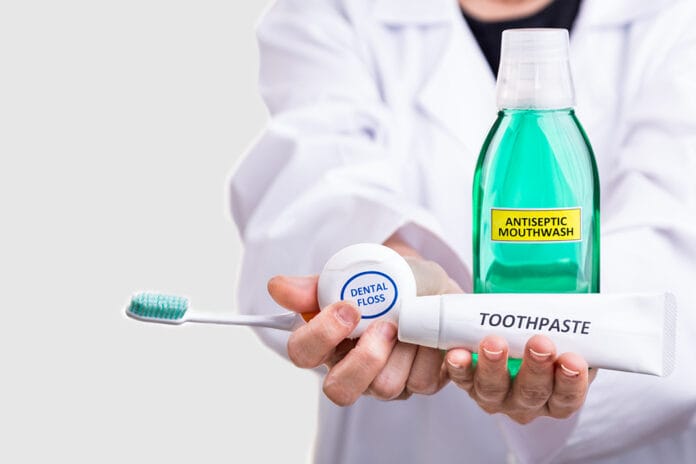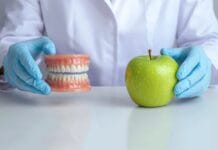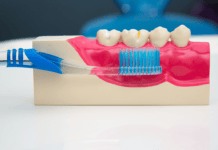Due to the COVID-19 crisis, people have been limited in living their normal lives, including visits with healthcare providers. In some areas, dental visits have been down or put on the back burner due to governmental mandates about dental treatment, patients’ fears of catching the virus, and the lack of dental professionals returning to practice. Dental patients are seeking out other resources to get by.
To capitalize on this, big-name brands and manufacturers have resorted to extreme marketing measures. There are advertisements focused on children during the day, and then the advertisements target adults and families during the afternoon and evenings. So many products are on the market these days, and consumers do not know which to purchase and which are best for them.
It remains as important as ever that we properly educate our patients about which products best suit their needs. Even before the COVID-19 crisis, our patients were susceptible to both oral and systemic diseases. Those who have recovered from COVID-19 have experienced weaker immune systems and lingering side effects, which may put them at greater risk for developing periodontal disease and other health manifestations.
Dental hygienists see patients routinely on a three- to six-month cycle, depending on their care plan. Since we have built the patient-clinician trust factor, we must do our part and properly educate our patients in order to offer complete care.
Yes, we already do the necessary gathering of patient data, classifying and treating their periodontal needs, and providing oral hygiene instructions before they leave. But is your education approach effective, or should you modify your approach? How many times have you recommended your patient to use a power brush or special mouth rinse due to their home habits, but they still have stain, biofilm, calculus deposits, and complain of hypersensitivity when they return? According to Misra, et al., “Patients do not recall as much advice and agreed actions about future dental care as dentists believe they have discussed. These results have implications for patient adherence with oral health instructions.”1
So, What Do You Do Now?
Do you just keep on as you are, or do you change your approach?
Dispensing oral health products in your practice provides the convenience your patients want and the options they need. No more is it “unprofessional to sell products” in the dental office. Dental offices are advertising products on their websites and even by marketing free whitening specials on their social media pages to draw in new patients and retain their current ones.
Dental hygienists are not just teeth cleaners. We are co-clinicians who have spent many hours and years on our dental education, skill training, and enhancing ourselves through continuing education courses. With all of our experience and knowledge, dental hygienists are well equipped to discuss with patients their treatment options. Remember, you are not selling anything; you are recommending services and products that your patients may already be interested in or may benefit their oral health treatment.
Over the past 21 years, I have worked in or consulted with offices that offered home care products and those that did not. The offices that did not offer home care products did not have as much success with patients purchasing what was recommended. Patients would comment that they had forgotten which product to purchase, felt it was a hassle trying to navigate the oral care aisles, or the items were too expensive at retail.
Offices that offer products in the practice had the opposite experience. Their patients were more apt to purchase the product recommendations because of the convenience, personalized education and care instructions, and the cost was much less. There are also some dental products that are covered by utilizing Flex Spending Accounts to lessen a patient’s financial burden. Patients should contact their plans for an approved product list.
As a dental hygienist, having home care products available to offer to patients is a must. Knowing that I have something at my fingertips that works and demonstrating to the patient how it will help them is of great importance. When I share my own personal experiences with a product and how I value it, this increases my patient care acceptance. The patients felt confident in the products I was recommending to them because I personalized the products to fit their specific needs and conditions. I gave my personal testimonial or even shared another person’s success, which they could also relate to. There was never a time that I felt I was “selling” anything as I explained the “what, why, and how” the product would help benefit them.
Why is it A Good Idea to Offer Products?
- Offering home care products in your practice creates value and convenience for your patients.
- As healthcare providers, we want to be sensitive to our patients` needs, and offering home care products will provide a much-needed service that patients really appreciate.
- You will save your patients time and money by enhancing your patient care approach.
- This will set the tone for excellence in your office. Patients now will think of your office as “cutting edge” when you provide that office’s caliber in services and products.
How to Get Started with Dispensing Products?
If your practice does not currently offer products, then have a conversation with the doctor about your personal preferences or items of interest that you saw in a dental hygiene publication or trade show. To learn more about a specific product, schedule lunch-and-learn trainings with your local manufacturer representatives (virtual or in-person are offered). Your reps will provide your team with samples, talking points, demo models, and other ideas to help you be successful. Then, it will be up to your office to decide which products to offer and dispense.
If you have a hygiene assistant, he/she should be as familiar with the product as you are, and even the front desk staff should be equipped with two or three talking points for patient interaction.
If this new product-dispensing initiative is done properly, it will result in a true win/win situation. Patients enjoy the convenience of purchasing home care products at their appointments, and they are instructed on how to use those products properly that same day. The office staff gets the satisfaction of knowing that patients have purchased the correct products for their home care, they properly provided the instructions, and the practice also earns a profit from the patient’s purchase.
Patient Connection
Despite the current state of our environment, country, and the world, dental healthcare providers must continue to act for our patients’ best interest. We must recommend care that will help improve and maintain our patients’ oral health, which directly affects their systemic health. Other ways to stay connected with our patients include teledentistry platforms, phone calls, social media chats, and websites’ live chatbox features, to just name a few.
Dental hygienists must take into account that we are providing a service to our patients when we recommend the necessary treatment and oral health adjunctive services. When you speak and share your product recommendations, confidently, remember to show the value, and the patient will trust your advice.
Some manufacturers have a program that allows the provider to order products online and shipped directly to the patient’s home. Unfortunately, we do not know what tomorrow brings. If our dental offices will be shut down again, at least we know that we have offered our patients useful oral healthcare tools and provided proper education that they can use.
Now Listen to the Today’s RDH Dental Hygiene Podcast Below:
Reference
- Misra, S., Daly, B., Dunne, S., et al. Dentist-patient Communication: What Do Patients and Dentists Remember Following a Consultation? Implications for Patient Compliance. Patient Preference and Adherence. 2013 Jun 17; 7:543-9. DOI: 10.2147/PPA.S43255. Retrieved from https://pubmed.ncbi.nlm.nih.gov/23814463/.












